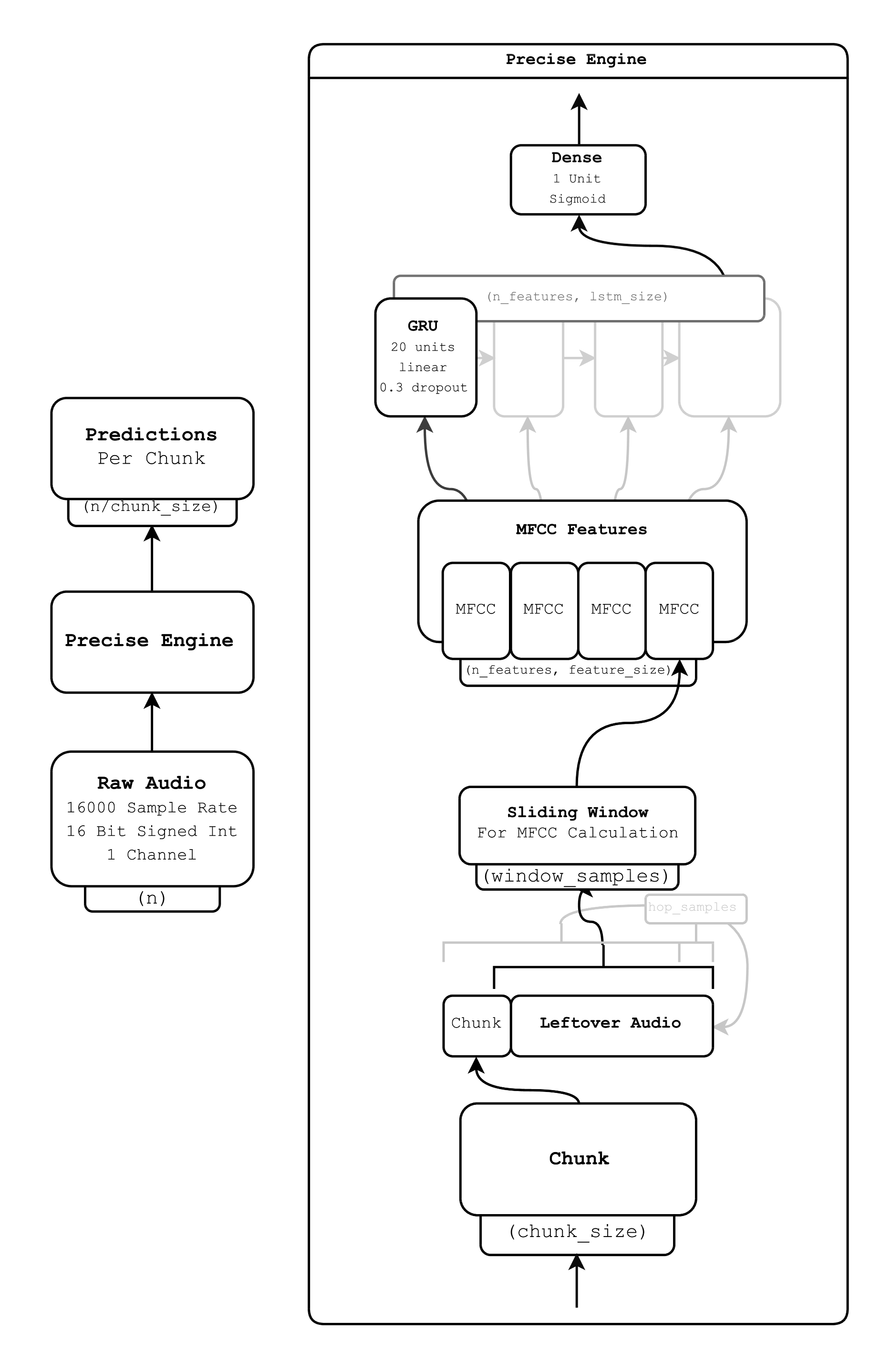A lightweight, simple-to-use, RNN wake word listener.
Precise is a wake word listener. The software monitors an audio stream ( usually a microphone ) and when it recognizes a specific phrase it triggers an event. For example, at Mycroft AI the team has trained Precise to recognize the phrase "Hey, Mycroft". When the software recognizes this phrase it puts the rest of Mycroft's software into command mode and waits for a command from the person using the device. Mycroft Precise is fully open source and can be trined to recognize anything from a name to a cough.
In addition to Precise there are several proprietary wake word listeners out there. If you are looking to spot a wakeword Precise might be a great solution, but if it's too resource intensive or isn't accurate enough here are some alternative options.
Precise is designed to run on Linux. It is known to work on a variety of Linux distributions including Debian, Ubuntu and Raspbian. It probably operates on other *nx distributions.
Training takes lots of data. The Mycroft community is working together to jointly
build datasets at:
https://github.com/MycroftAI/precise-community-data.
These datasets are available for anyone to download, use and contribute to. A number
of models trained from this data are also provided.
The official models selectable in your device settings at Home.mycroft.ai can be found here.
Please come and help make things better for everyone!
You can find info on training your own models here. It requires running through the source install instructions first.
If you just want to use Mycroft Precise for running models in your own application, you can use the binary install option. Note: This is only updated to the latest release, indicated by the latest commit on the master branch. If you want to train your own models or mess with the source code, you'll need to follow the Source Install instructions below.
First download precise-engine.tar.gz from the precise-data GitHub
repo. This will get the latest stable version (the master branch). Note that this requires the models to be built the the same latest version in the master branch. Currently, we support both 64 bit Linux desktops (x86_64) and the Raspberry Pi (armv7l).
Next, extract the tar to the folder of your choice. The following commands will work for the pi:
ARCH=armv7l
wget https://github.com/MycroftAI/precise-data/raw/dist/$ARCH/precise-engine.tar.gz
tar xvf precise-engine.tar.gzNow, the Precise binary exists at precise-engine/precise-engine.
Next, install the Python wrapper with pip3 (or pip if you are on Python 2):
sudo pip3 install precise-runnerFinally, you can write your program, passing the location of the precise binary like shown:
#!/usr/bin/env python3
from precise_runner import PreciseEngine, PreciseRunner
engine = PreciseEngine('precise-engine/precise-engine', 'my_model_file.pb')
runner = PreciseRunner(engine, on_activation=lambda: print('hello'))
runner.start()
# Sleep forever
from time import sleep
while True:
sleep(10)Start out by cloning the repository:
git clone https://github.com/mycroftai/mycroft-precise
cd mycroft-preciseIf you would like your models to run on an older version of precise, like the stable version the binary install uses, check out the master branch.
Next, install the necessary system dependencies. If you are on Ubuntu, this will be done automatically in the next step. Otherwise, feel free to submit a PR to support other operating systems. The dependencies are:
- python3-pip
- libopenblas-dev
- python3-scipy
- cython
- libhdf5-dev
- python3-h5py
- portaudio19-dev
After this, run the setup script:
./setup.shFinally, you can write your program and run it as follows:
source .venv/bin/activate # Change the python environment to include precise librarySample Python program:
#!/usr/bin/env python3
from precise_runner import PreciseEngine, PreciseRunner
engine = PreciseEngine('.venv/bin/precise-engine', 'my_model_file.pb')
runner = PreciseRunner(engine, on_activation=lambda: print('hello'))
runner.start()
# Sleep forever
from time import sleep
while True:
sleep(10)In addition to the precise-engine executable, doing a Source Install gives you
access to some other scripts. You can read more about them here.
One of these executables, precise-listen, can be used to test a model using
your microphone:
source .venv/bin/activate # Gain access to precise-* executables
precise-listen my_model_file.pbAt it's core, Precise uses just a single recurrent network, specifically a GRU. Everything else is just a matter of getting data into the right form.

